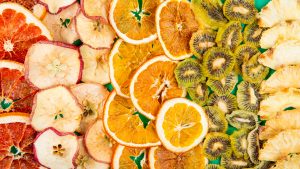With fresh ingredients at the ready and a long tradition of creative cooking, a tasty snack is never far away when you’re in Vietnam. Some come with age-old stories, while others take great Vietnamese products and elevate them with a modern twist. From salted egg chips to mung bean cakes, these delicious goodies make fantastic gifts for your loved ones back home.
Mung bean cubes (Banh dau xanh)
A cube of sweet mung bean that melts in your mouth goes perfectly with hot cups of green tea, so much so that when Bảo Đại, Vietnam’s last emperor, first stumbled upon this heavenly treat, he allowed the people to print the royal symbol of a golden dragon on the packages. To this day the cubes are often wrapped in the colours of royalty: red and gold.
Coconut candy (Keo dua)
A trip to the Mekong Delta is not complete without a visit to the coconut candy workshop. Watching the workers chop up strips of coconut candies and wrap them up in rice paper is just as appealing as tasting them right at the source. The milky, rich coconut confections are a specialty of Bến Tre Province, where coconuts are well known for their unmatched sweetness.
Peanut and rice paper brittle (Cu do)
Peanuts covered in molasses and malt sugar are sandwiched between two sheets of rice paper in this unique confection. The stickiness of peanuts and molasses is balanced by the crusty toasted rice papers in every bite. Kẹo cu đơ originated in Hà Tĩnh, a North Central province where people have been making candied peanuts for generations.
Sesame candy (Me xung)
Since the 1950s, foreign merchants who passed by Huế, the imperial capital of Vietnam, have bought sesame candy as gifts for their friends and family back home. Traditionally, Huế locals eat these treats while waiting out the long monsoon rains. Chewing through the stickiness of malt sugar in these snacks requires patience, just like the rain here.
Dried fruits (O mai)
A speciality of the capital Hanoi, ô mai is made by mixing dried fruits such as plums, apricots, and peaches with sugar, salt, lime, chili, or ginger. The dried fruits can be sweet or savoury, and deliver many health benefits. Ô mai used to be a rich man’s snack in Vietnam hundreds of years ago, but it can now be found in every Hanoian home, especially during Lunar New Year.



